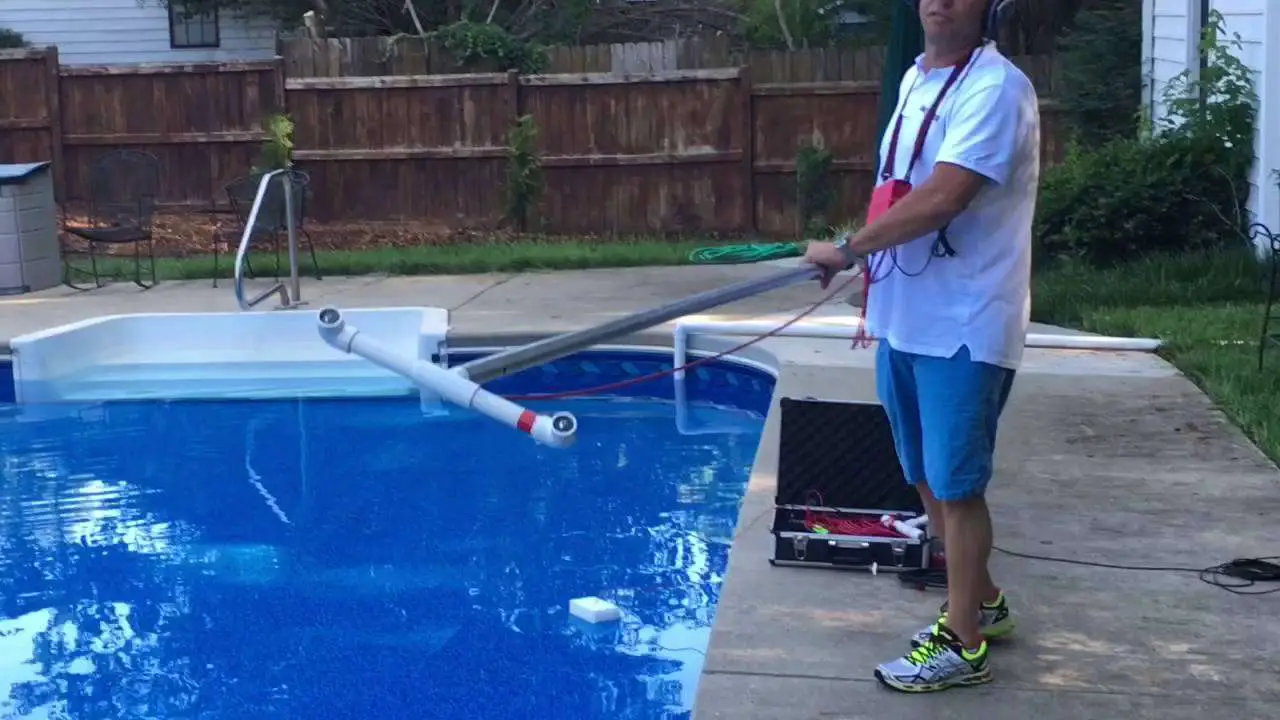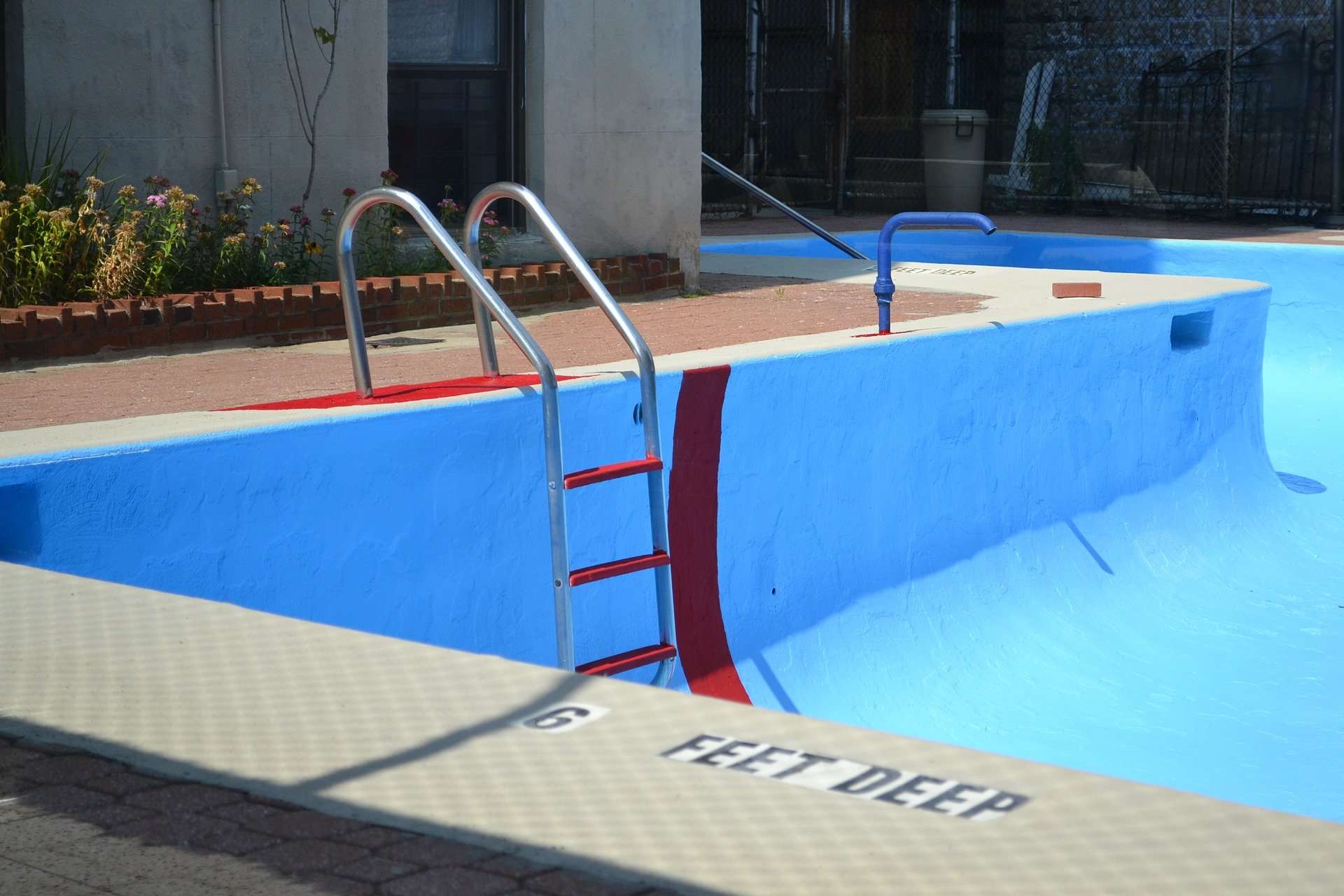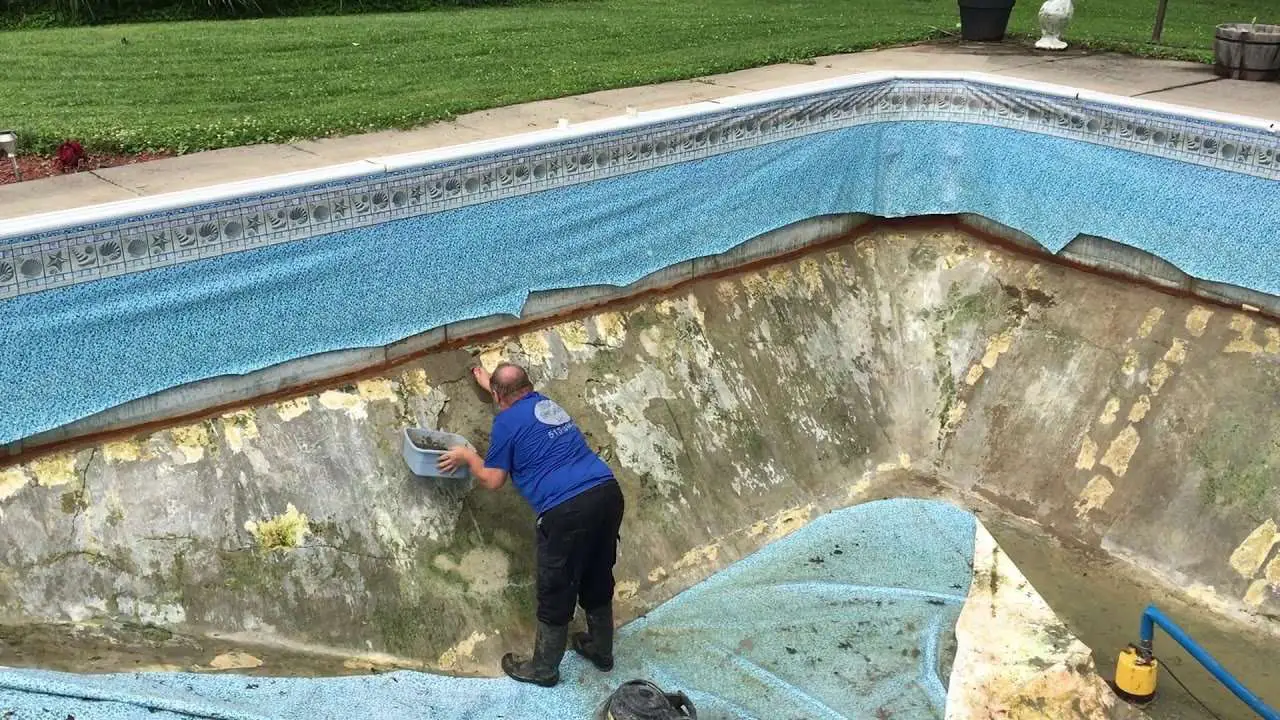How Do I Know If My Pool Has A Leak Or If It Is Water Evaporation
Identifying leaks in a swimming pool or spa can be a difficult and expensive task. Leak detection and repairs can cost hundreds, sometimes thousands of dollars. Pool owners, everywhere, feel the need to conserve water daily. In drought-stricken states such as California, pool owners cannot afford to lose hardly a drop of water from their pools. A powerful solution is needed, so lets talk evaporation first.
Evaporation
Six to eight feet a year is simply the evaporation rate in the parched Southwest, writes Scott Webb, Executive Editor of AQUA Magazine in his editorial entitled, Its Time. We cant say were serious about conserving water if we leave sitting out in the sun, Webb continues. Its time for every pool in the southwest to be covered.
Evaporation is the main reason for water loss. *A pool in the southwest will lose all of its 18,000 gallons of water every year through evaporation. A pool cover, or solar blanket, will physically cover the pool and reduce evaporation. However, covers are hard to maneuver and prevent you from fully enjoying the aesthetic quality you sought when deciding to install your pool.
Now you can have all the benefits of a pool cover without the hassle, thanks to Aqua Blanket.
How does Aqua Blanket work?
Aqua Blanket suppresses pool water evaporation, providing the following benefits:
To read more about Aqua Blanket click here.
Pool Leaks
This Post Has 0 Comments
Swimming Pool Leak Detection 101
Zach Morris
As a swimming pool owner, you have a convenient place to escape, exercise and enjoy with your friends and family. But just like owning a car, house or boat, you can preserve the quality and longevity of your pool with routine and preventative maintenance, like pool leak detection.
The good news is that pool leaks dont have to mean the end of your pool. By catching a pool leak early, you can avoid worsening damage that needs costly repairs. The key is understanding the early signs of pool leak detection.
Leak Detection Test No : The Evaporation Test
In the evaporation test, author Tamminen suggests filling a bucket and placing it on the deck next to the pool or spa. With an indelible pen, mark the level in the bucket and also for the pool or spa. Turn off the circulation. Wait a few days, then mark the new level in the bucket and pool or spa. Both the bucket and pool water should evaporate equally . If the pool or spa level is significantly more, you may have yourself a leak. If the water levels evaporate at the same rate, then it is probably not a leak.
Don’t Miss: Does Costco Carry Pool Supplies
Increase In Water Consumption
Have you noticed any abnormal consumption of water during the month? If your pool has an automatic fill device, you should watch for any high consumption. If the automatic fill device is constantly running, you have a leak.
An electronic water fill system works by maintaining a consistent pool water level. If the system detects low water conditions, it will automatically replace the water. The gadget uses sophisticated electronics to track water levels.
Thanks to its lockout feature, it will not overfill your pool.
Is My Pool Leaking 4 Simple Steps To Check For Pool Leaks

Just imagine you walk into your backyard on a beautiful summer day, slip off your flip flops, and get ready to dive into the shimmering water of your pool.
But you hesitate because something doesnt look right. Is your pool water level lower than usual? Could there be a leak in your pool?
The first thing is to do is not panic! Although any leak should be repaired to maximize your pools energy efficiency, not to mention your enjoyment of it, its best to first make sure there actually is a leak.
If there is a leak, its a good idea to try and narrow down where it might be to minimize the time and cost it may take to repair it.
You May Like: Countryside Ymca Pool Hours
Water Near The Equipment Pad
If you find water near your pools equipment pad, it is important to inspect the area to verify that the water buildup is due to a leak. There are quite a few areas where leaks can occur at the equipment pad, including the valves, filter, heater, and the pump. Keeping the area under careful observation for a day or two will usually reveal the source of the leaking water.
Test # : The Dye Test
Grab some red food coloring, goggles, and a snorkel. Let the pool drain. If the water stops draining, the leak is somewhere along the top of the pool. If the pool drains all the way to the bottom, the leak is at the bottom of your pool. If this happens you probably will need to add water in order for this test to work correctly. Now that you know the general area of the leak, check the ground or the walls for wetness. Once you have a good idea of where the leak is in hop into the pool. Be careful not to disturb the water, and go to the area where you believe the leak might be. Using your goggles and snorkel move towards the wall or bottom of the pool and squirt the dye. If you actually found the leak the food coloring will flow towards the leak by itself.
Recommended Reading: When Does The Ymca Outdoor Pool Open
Look For A Leak In Your Pool With Food Coloring
If your pool has a leak apart from the electrical elements or water filtration component, youll need to look for a leak inside of the pool. There is a simple method of find its source by using food coloring.
Here is what you have to do:
What will happen is the food coloring will travel towards the filter as well as the leak. You will visually be able to see its pull on the coloring. Yes, your pool will be tinted for a day or 2, so this method works better on smaller pools.
How To Tell Where Your Pool Is Leaking
Now that youve confirmed you have a pool leak, its time to locate the source so it can be repaired. Pool leaks in the equipment pad are common and easy to find because they usually leave behind drips or puddles of water. Pool leaks in skimmer boxes and drain sumps are also common and can be determined by performing a dye test. You can use the phenol red pH indicator reagent from your pool test kit as the dye for this process.
To complete a pool leak dye test, follow these steps:
If you cannot locate your pool leak through drips, puddles or a dye test, you may have a leak in your underground pool plumbing system thatll require a pool leak detection company to find. A pool leak detection professional can isolate and pressurize your pools plumbing system and use ultrasonic equipment to locate the leak.
Don’t Miss: How To Clean Concrete Pool
Tips For Finding Skimmer Leaks
The purpose of a pool skimmer is to catch the larger debris from your pool water as it begins to circulate through your filtration system. Since a huge percentage of your pool water flows through the skimmer as it makes its way to your filter, a leak in this part of your pool poses serious problems to your property. If you have a gunite pool, you can find the skimmer encased in concrete within your pools bond beam.
If you keep on topping off your pool because its water levels are constantly dropping, then you know that the issue is not merely water evaporation due to the summer heat but a pool skimmer leak. If you suspect that your swimming pool has this problem, dont fret. These leaks are easy to fix as long as you detect them early and your pools skimmers are not yet physically damaged. Most leaks coming from the skimmer are easy to fix because they are only caused by the skimmer pulling away from the concrete.
Before we discuss the actual steps in finding leaks in your skimmer, here are a few things you need to remember:
Is Your Pool Leaking How To Detect
Pool leaking detection is a specialised and yet extremely important art. Your pool will naturally lose some water to evaporation, some to splash-out and some to backwash wastewater. You will also gain water from rainfall. The ordinary rule of thumb is that if youre routinely adding more than two inches of water to your pool per week, you probably have a leak that is worth spending some time and possibly money to repair.
Pools are meant to be watertight but sealants will deteriorate while other parts of your pool shift and settle or just plain wear out. Pools can leak through any of the fittings or accessories, plumbing, or even right through the shell. It is important to repair leaks, not only to save water, heat, and chemicals but also to prevent undermining pool structural components and washing away fill dirt that supports the pool walls and pool deck.
Pool leaking detection is a highly specialized branch of the industry. Ninety-five percent of all phone calls I get from worried pool owners about a leak turns out to be inexpensive to repair. So relax, if you cant take care of the problem yourself a professional will be equipped to do so for you. If you suspect a leak, review the following things before calling for service:
Read Also: Pools At The Venetian
Schedule A Professional Leak Detection Test
If all tests indicate your pool has a leak, contact a reputable leak detection service to conduct a test. To make sure you get an accurate leak detection test, vacuum and clean the pool vacuumed and beforehand. Dirt and debris in the pool can make it challenging to spot even large leaks. Water should be as clear and clean as possible. If it is green it most likely means your pool has mildew, algae, or fungi.
Why Do Pools Leak

Pools are constructed so that they are watertight and even though pools seem pretty basic, there are a lot of parts and pieces involved in keeping it that way. Seals deteriorate, pools may shift over time, or the ground its dug into settles. Pools often leak through plumbing fittings, accessories like light fixtures, and even through the shell or liner. Its critical to find and fix leaks to not only save monetarily on things like water, heat, and chemicals, but to keep from the undermining pool structure from gaining water and washing away fill dirt.
Recommended Reading: How To Take Calcium Off Pool Tile
Check The Ground Around The Pool
Even with an in-ground, this will sometimes help figure out the location of the leak. Walk around the perimeter of the pools edge and take note if you happen to slosh through any areas.
If you have tiling, papers, or deck, checking for any usual wet spots may give you clues as to the general area of a potential leak.
Need Of Speed For Leak Location
The most important reason that we utilize this technology is the need for speed of leak location. Other traditional methods can be time consuming and take days to determine if a pool is leaking. After days of testing with traditional methods the data is not always conclusive as it is with our technology.
Leaks waste water, heat and chemicals not to mention swim and recreation time they can cause structural damage to the pool liner, floor and deck. Our leak detection equipment will confirm a pools leak status before investing time in extensive leak location procedures.
You May Like: Swimming Pool Tile Grout Sealer
Is Leakage Greater When The Pump Is Circulating
Leakage that is greater when the pump is circulating may be a sign of a leak in the return plumbing downstream from the pump, known as the pressure side of the system. After the pump is pressurized, leaks ranging from minor seepage to high-pressure sprays may develop in the any of the downstream plumbing fittings when the pump is running. Internal leaks may also occur in a defective filter multiport valve, causing the loss of clean water down the waste or backwash line into the sewer.
Is Water Loss Always A Leak
A sudden drop in the pool water level may not necessarily be the result of a leak. Evaporation rates from a pool can vary widely with changes in air temperature, relative humidity and wind speed. A simple test can rule out evaporation as a source of water loss in your pool. Fill a bucket with water and mark the level of water in the bucket and the water level in the pool. Place the bucket beside the pool and compare the two water levels 24 hours later. If the water level in the pool has dropped more than the level in the bucket, you probably have a leak.
Read Also: What Are Pool Cages Made Of
The Bucket Test For Pool Leak Detection
If you have some of these symptoms but youre not quite sure if it is a leak, then you can make sure by using the bucket test.
The bucket test is simple but can accurately diagnose a leak. All youll need is a large bucket and a marker or duct tape. This is how you do it:
You can clearly see in the bucket how much water has evaporated since you started the test. If your pool has lost more water than the bucket has, it is leaking water.
Repeating this test will help if the first round leaves things ambiguous.
Cracks In And Around Your Pool
Just like driveways and sidewalks, pools can develop cracks over time that can lead to a wide range of problems in your pool. Some smaller cracks can sometimes be sealed while more expansive problems may require professional resurfacing. Cracks in and around your pool are a clear indicator or a leak or potential leak. A professional will need to come to your home and repair the cracks before major damage occurs.
Recommended Reading: Remove Iron From Pool
Does The Pool Leak All The Time
This does not rule out leaks in the plumbing, but turns a suspicious eye on the shell of the pool, looking for cracks in the plaster or tears in the vinyl. Look closely at the tile line and look real closely inside of the skimmer. The most common leak we fix is a separation between the plastic skimmer and the concrete pool. This is easily fixed with some pool putty. If you see something that looks like a crack, drop some test dye near it with the pump shut off and water still to see if the dye is sucked into the crack. Under water lights can and do leak as well, especially the conduit that runs from the light niche to the junction box. Filling the opening of the conduit in the back of the light niche with pool putty, black butyl tape, or using a cord stopper are ways to fix this problem.
How To Find That Pesky Leak In Your Swimming Pool

The discovery of a leak can be a real headache for any pool owner. Even if youre aware that youve sprung one, pool leak detection can be an even bigger headache!
Across a large pool who can find the smallest crack at first glance? Leaks can occur anywhere in your pool, including inside the plumbing itself.
Searching one out can feel like finding a needle in a haystack. Yet, a pool leak needs finding and fixing if you want to keep swimming.
An undiagnosed leak in the plumbing can cause major problems in your yard too. This may even lead to sinkholes. Usually, these arent the giant type but any sinkhole is bad news.
Pool leak detection will help you identify where that leak is, so you can get it patched up and avoid these problems.
This is a much bigger process than just walking around looking for a drip! It starts with figuring out if a leak is to blame for your symptoms. Then trying to deduce where the leak is by its cause.
Pools dont tend to begin leaking by themselves. To make pool leak detection easier on yourself, you can narrow down the suspected leaking areas through a few tests.
The first step is to diagnose your pool.
Recommended Reading: How Do You Get Iron Out Of Pool Water
Signs You Have A Leak In Your Plumbing System Include
- Low Water Pressure The more air in your lines, the less room there is for water. Be sure to check your filters pressure gauge and if the PSI rating is lower than your normal reading, use the filters air relief to release air pressure.
- Unable to Prime If your pump suddenly is unable to be primed, it could be as simple as a closed valve or a blocked impeller. Be sure to check a few other things to really single out this issue.
- Losing Prime If the pump runs dry after manually priming the pump with a hose, it could be a sign of a more severe air leak.
- Air Bubbles The most common sign you have air in your lines, air bubbles throughout your pool during the runtime of the pump shows an issue that needs further diving into.
